Cash Crunch Cuts City Snow Plowing, Paving, Trash Pickup; RTD Slashes Costs By $140 Million, Change/Cut Bus-Rail Routes
by Glen Richardson
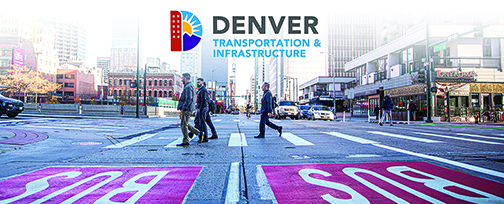
Help Heave-Ho: Expect to endure shoddy streets, service as Denver’s Department of Transportation & Infrastructure axes 100 staffers. Department will spend $21 million less than it did in 2020.
A sense of uneasiness lingers over the Mile High City despite the Governor lowering the pandemic dial to orange and the Mayor applying for Five Star Certification. As the New Year gets underway residents and business owners are fearful the “feel good” moment won’t last. As the city-county responds to the pandemic it has triggered a mounting budget crisis with revenues declining abruptly and costs rising sharply.
Moreover, many businesses have closed while others continue to operate at reduced hours. People are continuing to spend low amounts of money in Denver and tourists aren’t showing up. As a result sales and tourism taxes are down, forcing the city to severely cut spending. Despite uncertainty about the path ahead, much is known about how the scissor effect of Denver’s reduced budget will impact residents and visitors in the months ahead.
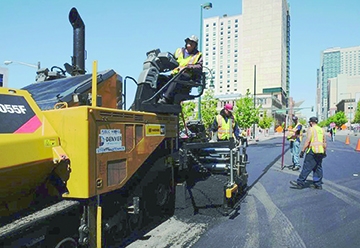
Paving Perishes: Denver has cut street maintenance crews by 17 workers this year. The city-county expects to pave 465 miles of lanes this year, about the same as in 2018.
Here’s how the economic tailspin will impact everything residents are accustomed to from street paving, trash pickups and snow plowing, to reduced train and bus service:
Budget, Staff Cutbacks
The services residents enjoy and have come to expect from the City & County of Denver requires people and money to make them happen.
Nowhere is the economic shock being felt worse than at the Department of Transportation & Infrastructure, formerly known as Denver Public Works. Denver’s budget cuts will mean the department will have 100 fewer staffers. That’s due to the city offering early retirement to employees — workers with more than 1,000 total years of department experience and knowledge — plus vacant posts that are going unfilled.
Current city workers are being required to take on the duties of retirees as tax dollars have dried up. Department officials claim city workers “will do more with less.” The department’s chief financial officer Seth Runkle anticipates, or is at least hoping, the department can deliver the same service with fewer staff. “It can be a little easier when the coffers are flush, but it doesn’t always mean we’re doing it at the most efficient level.” The department still has about $128 million to spend, but that’s more than $21 million less than in 2020. The budget cutback will mean less overtime, training, travel and tools to work with.
Here are the changes residents can anticipate they will undergo and endure this year as the city works with less money and staff:
Snow Plowing
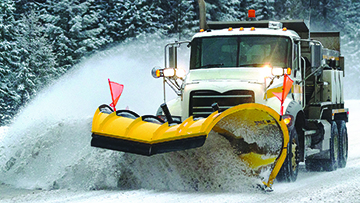
Snow-Money Mix: City Council was told snow plowing of residential streets is “at risk” this year. Later officials declared the city “is fully prepared to handle major snowstorms.”
Denver’s City Council was told by Todd Richardson, the department’s head of operations, that the city’s residential street and bike lane plowing programs are “at risk” this year (2021). He based the cautionary calculation on reductions in overtime allowed plus hiring freezes.
Department officials Eulois Cleckley and Seth Runkle, however, downplayed the statement declaring the city “is fully prepared to handle major snowstorms.” Their prediction is apparently based on the fact Denver is now training Parks & Rec employees and parking enforcement people to plow.
The city expects to have two full shifts of 60 to 70 plows available plus the option to add a third shift for severe snow storms. The department also claims they are “fairly good” at maintaining equipment despite reduced staff.
Street Sweeping
If you live or work downtown don’t expect streets to
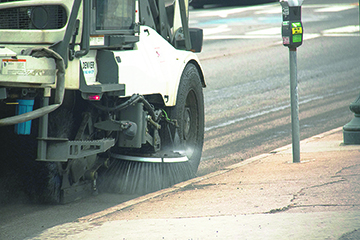
City Chucks Downtown Dust: Spotless streets are a thing of the past in downtown Denver as street sweeping has been cut back in the Central Business District.
be as spotless as they have been in past years. Reason: The city is cutting back on street sweeping in the Central Business District.
Official reason given by the city is “there will be less wear and tear on downtown streets” due to less foot and vehicle traffic.
Despite spending less to keep downtown streets clean, the city will continue to spend millions of dollars for bike lane construction and things being built in the right of way of streets.
Paving & Potholes
Residents can expect only about 465 miles of lanes to be paved this year as the department has cut 17 workers from its street maintenance crews.
That translates to about the same miles of lanes the city paved in 2018, but significantly less than even the 579 miles of lanes paved in 2020.
During the last couple of years (2019-20) street crews have been taking an average of four days to fix potholes. While it may take the same amount of time this year, the department is hoping to get the number down to three this year. The optimistic outlook is based on the theory there will be fewer cars on the road and therefore less stress on city streets.
Trash Pickup
Jumbo junk – belongings such as couches — residents want to dispose of will take twice as long as the city cuts big-trash pickups. The department’s solid waste arm is cutting pickup of oversized trash to every eight weeks in 2021. Last year they were collected every four weeks.
As the pandemic struck last year causing people to stay home more, city garbage trucks hauled 30% additional trash, recycling items and compost. Waste Management division’s Margaret Medellin told city council the increase nonetheless didn’t cause a slowdown to regular pickup schedules. Unless there is a significant additional increase this year, trash pickups are expected to remain normal.
Implementation of the city’s “pay-as-you-throw” program — that would charge residents a fee for trash pickup while making composting free — is being delayed. Originally scheduled to begin this year, the city has decided this is not the year to charge people extra money.
Bus & Rail Service
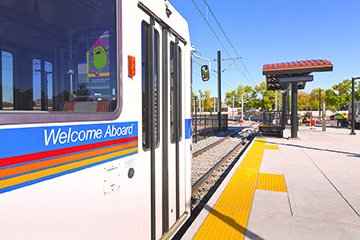
Trickle Down Transit Travel: Expect significant bus-rail service slowing as RTD slashes $140 million from its 2021 budget. At least 22 bus routes have been modified and rail lines are adjusted, reinstated, or suspended.
Residents and visitors will also see significant changes in bus-rail service as RTD has slashed $140 million from its 2021 public transit budget. Additionally, RTD’s current pandemic service plan provides about 40% less service than was offered in Jan. 2020. Nearly 400 employees are likely to be terminated and 300 vacant positions have been eliminated. Cuts also include furloughs and wage reductions for employees.
At least 22 bus routes have or will be modified this year. Some routes will also have Saturday-Sunday hours reduced. In addition, certain weekday bus hours are being reduced. Three bus routes were eliminated for 2021. Riders should continue to check RTD schedules.
Due to higher demand for rail service to downtown, C-Line service has been suspended and D-Line service reinstated. Adjustments are being allowed for northbound transfers to Union Station, and southbound transfers toward Littleton at I-25 & Broadway. Rail service on five other lines has been adjusted.
